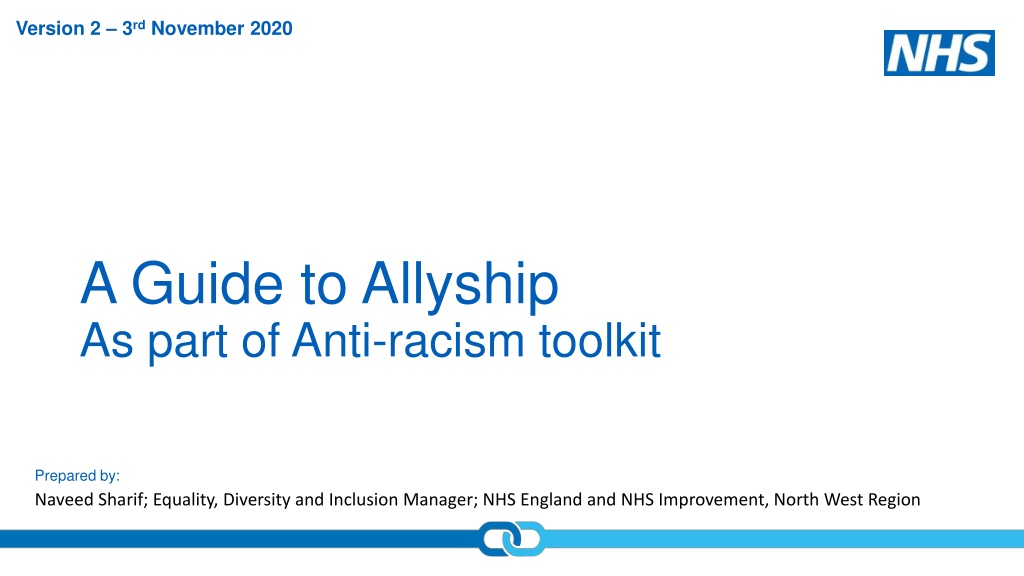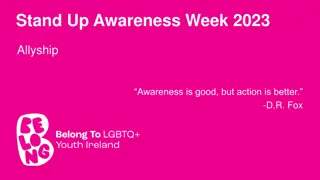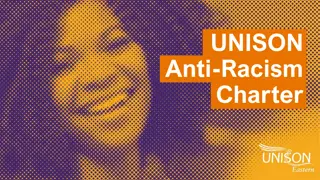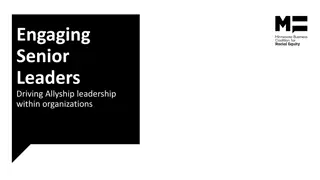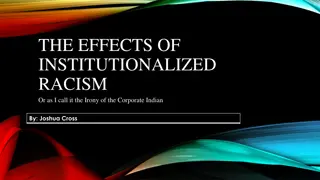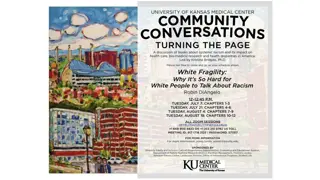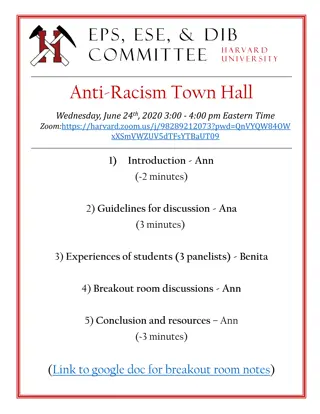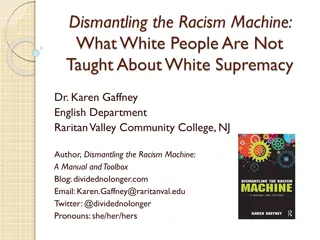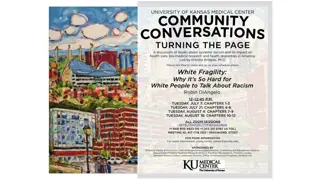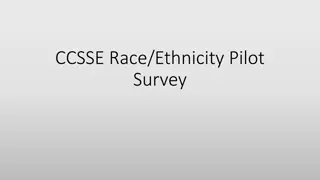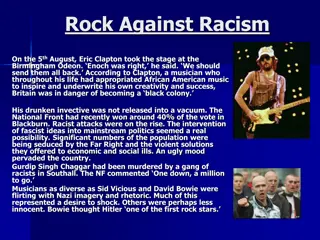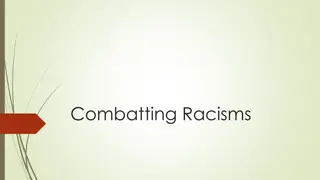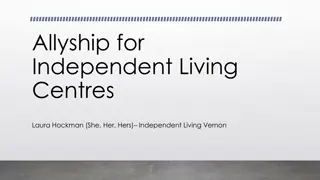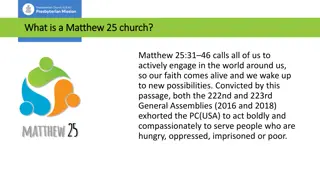Guide to Allyship: A Tool for Anti-Racism
This guide provides valuable insights into allyship as a crucial element of anti-racism efforts, emphasizing the importance of acknowledging privilege, amplifying oppressed voices, and taking on the struggle as one's own. It highlights the need for allies to educate themselves, own their mistakes, and stand up against discrimination, offering guidance on becoming an effective ally in promoting equality and inclusion.
Download Presentation

Please find below an Image/Link to download the presentation.
The content on the website is provided AS IS for your information and personal use only. It may not be sold, licensed, or shared on other websites without obtaining consent from the author. Download presentation by click this link. If you encounter any issues during the download, it is possible that the publisher has removed the file from their server.
E N D
Presentation Transcript
Version 2 3rd November 2020 A Guide to Allyship As part of Anti-racism toolkit Prepared by: Naveed Sharif; Equality, Diversity and Inclusion Manager; NHS England and NHS Improvement, North West Region NHS England and NHS Improvement
Why are we creating this Guide? There are many guides in the public domain and address specific challenges around Racism, Transphobia, Gender discrimination, Religion and Belief etc; This guide is part of a suite of tools around anti-racism, however this guide covers wider protected characteristics under the Equality Act 2010; There are very many reasons to why colleagues would become an Ally; Saying you re an ally is much easier than actually being an ally. Saying you re an ally looks good on paper, especially if you re never questioned about your inaction (Amelie Lamont, 2020); This guide is designed as many others to support colleagues looking into allyship to be best placed around the challenges of being an ally, a look at what it takes to become an ally and challenge the orthodoxies presented in the national WRES data, the recent publication of the Lawrence Report (2020), and of course the publication of Snowy White Peaks (Kline, 2014). 2 |
To be an ally is to... To be an ally is to... Take on the struggle as your own; Transfer the benefits of your privilege to those who lack it; Amplify voices of the oppressed before your own; Acknowledge that even though you feel pain, the conversation is not about you; Stand up, even when you feel scared; Own your mistakes and decenter yourself; Understand that your education is up to you and no one else. 3 |
What is an Ally and why are they necessary? Being an ally doesn t necessarily mean you fully understand what it feels like to be oppressed. It means you re taking on the struggle as your own. A individual from an underinvested community cannot easily cast away the weight of their identity (or identities) shaped through oppression on a whim. They carry that weight every single day, for better or for worse. An ally understands that this is a weight that they, too, must be willing to carry and never put down. Anyone has the potential to be an ally. Allies recognize that though they re not a member of the underinvested and oppressed communities they support, they make a concerted effort to better understand the struggle, every single day. Because an ally might have more privilege and recognizes said privilege, they are powerful voices alongside oppressed ones. 4 |
The necessity of Allies Anyone has the potential to be an ally. Allies recognize that though they re not a member of the underinvested and oppressed communities they support, they make a concerted effort to better understand the struggle, every single day. Because an ally might have more privilege and recognizes said privilege, they are powerful voices alongside oppressed ones 5 |
What is involved in being an Ally? There is no doubt, being an ally is not plain sailing; Many would-be allies fear making mistakes that could have them labeled as -ist or -ic (racist, sexist, transphobic, homophobic, etc); This means that as an ally, there is much to unlearn and learn mistakes are expected. You need to own this as fact and should be willing to embrace the daily work of doing better. 6 |
The Ally Continuum https://eskalera.com/ 7 |
The Do: Do Do be open to listening Do Do be aware of your implicit biases Do your research to learn more about the history of the struggle in which you are participating Do Do the inner work to figure out a way to acknowledge how you participate in oppressive systems Do Do the outer work and figure out how to change the oppressive systems Do Do use your privilege to amplify (digitally and in-person) historically suppressed voices Do Do learn how to listen and accept criticism with grace, even if it s uncomfortable Do Do Do the work every day to learn how to be a better ally 8 |
The Dont: Do not Do not Do not Do not Do not Do not expect to be taught or shown. Take it upon yourself to use the tools around you to learn and answer your questions; Do not participate for the gold medal in the Oppression Olympics (you don t need to compare how your struggle is just as bad as a marginalized person s); Do not behave as though you know best; Do not take credit for the labour of those who are marginalized and did the work before you stepped into the picture; Do not assume that every member of an underinvested community feels oppressed. 9 |
Kayla Reeds (@iKaylaReed): How to Handle Mistakes? While mistakes are to be expected, what s the best way to go about resolving them? Reacting in a fair and helpful way isn t about learning arbitrary rules or being a doormat. When we take the politics out of it, it s just the reasonablething to do. Still, it s hard to remember in the moment, because these issues are so charged in our society. As such, it may be helpful to reframe the situation so that you don t feel defensive. You may have noticed it s easier to handle being corrected about something you didn t know if you re grateful for and even open to the opportunity to learn rather than embarrassed to have been wrong. Being able to let go of your ego is an incredibly important skill to develop. Try starting with Thanks for letting me know to put yourself in a better frame of mind. If after you say that, you need to take some time to think about the situation, that s fine, too. Just remember that this isn t about changing the other person s frame of mind. They re allowed to be upset about being oppressed . (Kayla Reed, 2020 and Amielie Lamont 2020). 10 |
Becoming an Ally for Diversity Becoming an Ally for Diversity (M. Walker) (11/09/2015). (M. Walker) (11/09/2015). 11 |
Credits https://guidetoallyship.com/ HTTPS://GUIDETOALLYSHIP.COM/ VIA AMIELIE LAMONT AND M. WALKER 2015 THIS GUIDE HAS BEEN UTILISED THROUGH: 12 |
